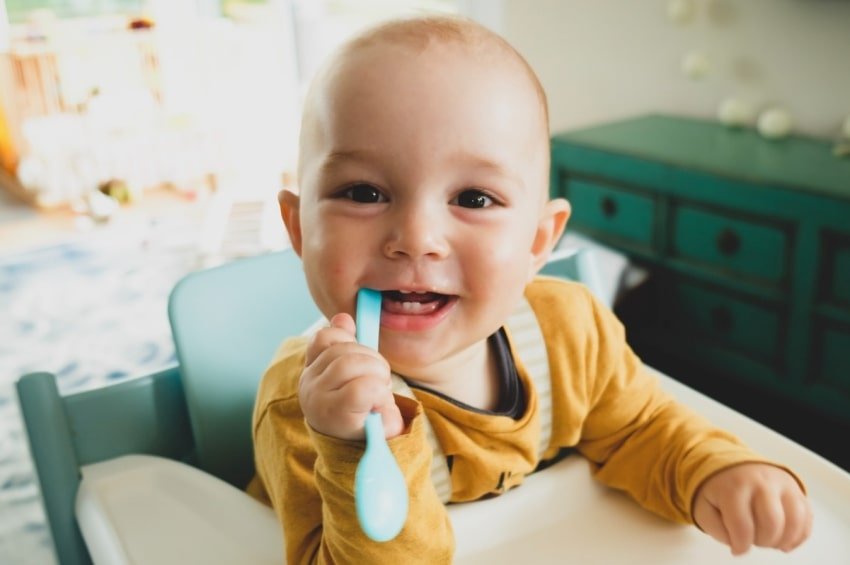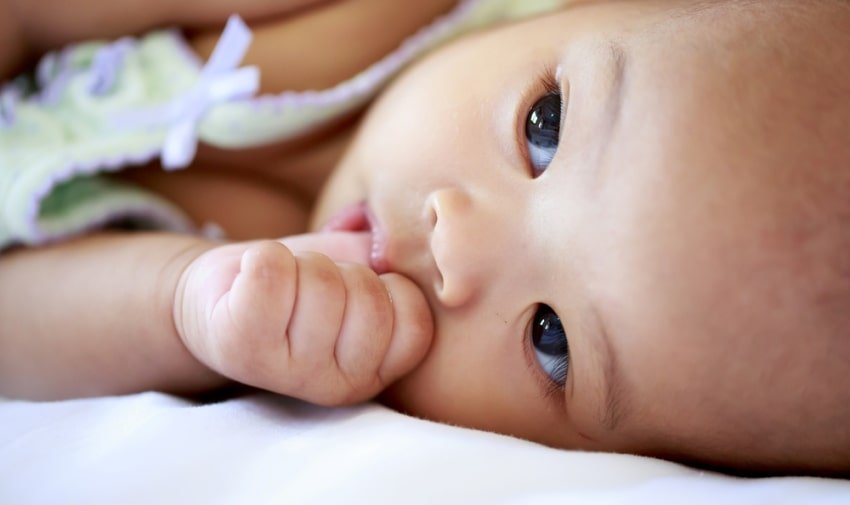Babies do a lot of things that might not make sense at first, and they do a lot of things that need to stop at some point before it causes long term damage. One of those things is your baby sucking bottom lip. This is an extremely common behavior, and most parents will notice this at various times.
However, it can cause problems in the future if this is a continuous behavior. For example, if your little one continues to suck on their bottom lip, it can cause the lip to continuously turn inward. First, you need to look for signs that your baby is sucking their bottom lip.
Signs Of Baby Sucking Bottom Lip
Sometimes you’ll see your baby sucking bottom lip once or twice, and that’s not really a problem. Other times, you need to look for other clues that your little one has developed a lip sucking habit.
Baby Sucking Bottom Lip
The most obvious sign is if you see your little one sucking their bottom lip. They will clearly have their lip in their mouth and will suck on it. You might notice that your baby does this temporarily while they are waiting to be fed, and it only lasts for a couple of seconds.
Other times, you might notice that it has truly become a habit.
Chapped Areas
If your little one sucks their bottom lip, they will develop a chapped area around their bottom lip. The entire area will appear red and irritated.
None of my children sucked on their bottom lip, but I did until I was around seven. If you haven’t seen your little one sucking their lip but it is red and in desperate need of chapstick, they’re sucking their lip.
Bruise On Or Around Bottom Lip
If you notice that your baby has a bruise on or around their bottom lip that is unexplainable, it could be because your baby is sucking on their bottom lip. Over time, them sucking so hard will leave a bruise. This will start out as a red mark, and over time it will turn purple.
Baby Sucking Bottom Lip: Reasons Behind The Behavior
In order to stop this behavior, or slow it down so that it does not become a habit, you need to understand why your little one has started lip sucking.
There are several reasons that they might be sucking their lip. One of the primary methods to help you determine why is to pay attention to when your little one is sucking their lip.
View in gallery
Teething
Most babies get their bottom teeth before their top teeth. Their gums get irritated and sore, which leads to them sucking on their lip. This is because they are also sucking on their gum, and the pressure can help ease the pain behind teething.
If your little one might be teething, watch for these other signs:
- White gums where teeth are cutting through
- Sticking things in their mouth
- Chewing on everything they can
- Drooling
- Irritability or fussiness
- Increased sucking
- No longer sleeps through the night
If your baby is experiencing these symptoms and sucking bottom lip, they are more than likely sucking their bottom lip because they are teething.
Provide additional methods of comfort, like making sure they have a pacifier, baby teething solutions, and you can trust that it will pass. If the area is chapped, apply a non-toxic cream to the area.
- Gentle moisturizing stick nourishes and soothes babys face, lips, nose, and cheeks. Protects against environmental conditions such as cold air and wind.
- Gentle formula with Cold Cream, natural Avocado Perseose, Ceramides, and soothing Shea Butter. Ideal for travel.
Prices pulled from the Amazon Product Advertising API on:
Product prices and availability are accurate as of the date/time indicated and are subject to change. Any price and availability information displayed on [relevant Amazon Site(s), as applicable] at the time of purchase will apply to the purchase of this product.
Self-Soothing
Most babies will attempt to self-soothe at some point. Even if you pick up your baby every time they cry, they might realize that being held does not make the pain behind teething go away. Self-soothing is also common in babies when they are tired.
Babies sucking their bottom lip is an extremely common way that babies try to self-soothe. If you notice that your little one has a rash around their bottom lip even though you never see them suck their bottom lip, they could be doing it at night when they are sleeping.
View in gallery
If baby sucking bottom lip is to self-soothe in the middle of the night, there’s not a lot you can do to prevent that. Unless you would like to sit beside them to make them stop all night, which is not realistic.
Instead, let your baby self-soothe, get some rest, and apply infant safe lip balm liberally a few times a day to help avoid chapped areas. If it leaves a bruise, your little one will stop on their own.
As children grow older, they usually stop this behavior on their own or are better able to control themselves so that parents can work with them to stop the behavior.
Baby Sucking Bottom Lip Because They Are Hungry
If your little one is hungry, they might do several things that involve biting or sucking. They may attempt to eat their hands, suck on their thumb, bite their lip, or suck on their lip.
If you notice that your baby is doing this right before feeding time, and they only do it when they are hungry you can trust that they will stop on their own when they get older.
View in gallery
When babies are able to say that they are hungry, they no longer have to self soothe before they are fed. If you’d like to stop this earlier than that, you can teach your baby sign language to communicate that they are hungry.
If your baby just finished eating, there could be a little bit of food left on their bottom lip. If it was something they enjoyed, they will try to suck the food off their lip. If your baby sucking bottom lip after you get done feeding him, he’s probably just trying to get that extra bite.
Stress
Sometimes, babies are stressed. They get cranky, they get tired, and they get overstimulated.
Simply passing a newborn baby around the room from person to person can overstimulate some babies. If your baby is stressed or feeling anxious, they are more likely to exhibit self-soothing behavior, such as lip biting or baby sucking bottom lip.
Watch for these other signs that your little one is stressed and needs to wind down:
- Squirming
- Hiccups
- Pushing away with his arms and legs
- Excessive crying
- Change in eating habits (eating more or eating significantly less)
- Change in sleeping habits (such as no longer sleeping through the night)
- Frantic body movements that are not a regular part of the development
If you notice this, your baby is more likely stressed. Removing them from the stressful environment, practicing regular calming techniques, like baby massage, and ensuring that they are not overstimulated are all great ways to keep your baby happy, and to prevent baby sucking bottom lip.
Normal Development
Sometimes, the baby sucking bottom lip is a normal part of development. There are several things that will make a baby suck on their lip that is okay, and, if this is the case, babies will stop on their own.
Teething
Teething is one of the common reasons that babies suck on their lips. Once babies stop teething, they will more than likely stop sucking on their lip.
Practice
It’s normal for babies to move, chew, and suck on every part of their mouth before they begin solid foods. This helps them understand how to use their mouth when they begin eating.
You can almost expect baby sucking bottom lip, chewing, or sucking on their tongue. This is all practice, and it’s a normal part of development.
Sensory Development
As babies get older, they learn about all kinds of things. They discover how to move their arms and legs, and they learn about how things look, sound, and feel.
If your little one just discovered how to suck on their tongue or lip, they might just be learning about how certain movements feel. This is another normal part of development.
As they grow older and learn new things, your little one will get distracted and move on to a new fascination. To help with that, pick up some sensory development toys.
- 3 Months plus
- BPA Free
- Perfect for tummy time and high chairs
- Fill with water and let the fun begin
- Characters float and move as baby bats and presses the mat
- 3 Months+
- BPA Free
- Perfect for tummy time and high chairs
- Fill with water and let the fun begin
Prices pulled from the Amazon Product Advertising API on:
Product prices and availability are accurate as of the date/time indicated and are subject to change. Any price and availability information displayed on [relevant Amazon Site(s), as applicable] at the time of purchase will apply to the purchase of this product.
Consequences Of Baby Sucking Bottom Lip
If your baby sucks their bottom lip for a few months, there will typically not be any adverse effects. However, if your little one continues to do this as they grow older, it can have a negative impact on their development.
Overbite
As teeth form and grow, the mouth consistently being in a position of the bottom lip being inside the mouth can result in an overbite. This means that the top teeth and lip protrude further than the bottom one. This can take years to correct if it is possible.
Speech Therapy
Children that grow up sucking on their bottom lip might try to talk around their lip instead of stopping sucking on it. This can result in them not properly learning how to pronounce letters and words. It can also result in years of speech therapy to correct the problem.
Typically, children will outgrow this behavior on their own. It’s usually a normal part of development. If your baby continues to suck on their bottom lip past 7-12 months or you are concerned, contact your pediatrician.
One common way to prevent baby sucking bottom lip is to use a pacifier. This gives them something else to suck on instead of their lip, which can be helpful.
- GLOWS AT NIGHT - These night pacifiers glow in the dark, making it easy for you to locate quickly at night without any stumbling and searching, so baby can sleep better.
- COMFORTABLE DESIGN – These cute pacifiers for babies are fun and functional. The curved shield with wide openings keep baby comfortable and allow baby’s skin to breathe.
- SILICONE NIPPLE – The BPA-free silicone nipple is a signature MAM pacifier design, with silky SkinSoft material and a symmetrical shape thats ideal for jaw and teeth development.
- STERILIZING STORAGE CASE - Add water and pop into the microwave to sterilize MAM pacifiers in just 3 minutes. No separate sterilizer means fewer baby items to take on the go!
- PRODUCT DETAILS – MAM Night Pacifiers, 2-Count Baby Boy Pacifiers, 0-6 Months, Sterilizing Pacifier Holder
Prices pulled from the Amazon Product Advertising API on:
Product prices and availability are accurate as of the date/time indicated and are subject to change. Any price and availability information displayed on [relevant Amazon Site(s), as applicable] at the time of purchase will apply to the purchase of this product.
Wrapping Up
Babies suck their lips for many different reasons. Generally, it’s nothing to worry about but it’s a good practice to pay attention to symptoms as they develop. If the behavior doesn’t cease, it may be cause for concern, and talking to your pediatrician may be a good idea. It’s nothing to be alarmed about, but long term lip sucking could lead to developmental issues and should be checked out.






